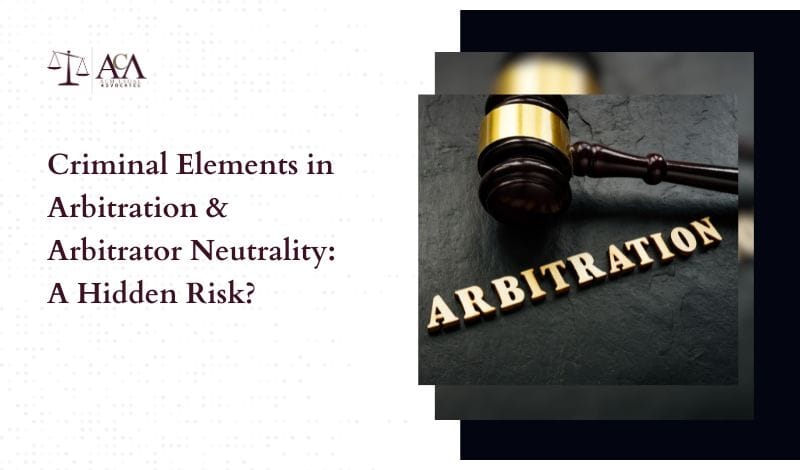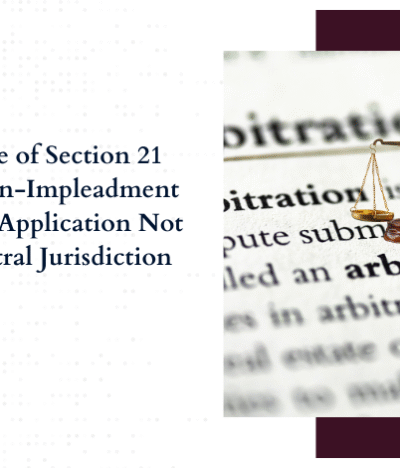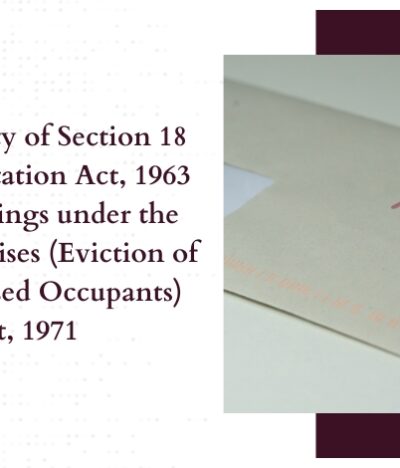Criminal Elements in Arbitration & Arbitrator Neutrality: Navigating the Gray Areas
Arbitration, while widely regarded as a more efficient and flexible alternative to court litigation, is not entirely immune to the infiltration of criminal elements. Instances of fraud, corruption or coercion can distort the otherwise civil nature of arbitration proceedings, raising concerns about the efficacy and neutrality of the process.
When criminal elements are involved, the question becomes: can arbitration still function as a fair and effective method of dispute resolution?
In India, the Arbitration and Conciliation Act, 1996, with its amendments, provides a robust framework to ensure fairness in arbitration. However, criminal activities, such as bribery or fraudulent acts by one party, can taint the process. Courts have frequently been called upon to address these concerns.
In cases like A. Ayyasamy v. A. Paramasivam, the Supreme Court ruled that while civil disputes involving minor frauds may proceed with arbitration, cases involving severe criminal allegations, such as those impacting public interest, must be resolved in court.
The neutrality of arbitrators becomes even more critical when criminal elements are suspected. The 2015 Amendment to the Arbitration Act introduced provisions ensuring that arbitrators remain impartial and independent. Specifically, Section 12 outlines situations where the appointment of an arbitrator can be challenged, particularly if they have a prior relationship with any party involved.
Defining Arbitration and its Process
Arbitration is a method of dispute resolution where an independent third party, the arbitrator, makes a binding decision on a disagreement between two or more disputing parties. This process is often seen as an alternative to traditional litigation, offering a more efficient and private way to resolve conflicts. Parties involved in an arbitration case agree to be bound by the arbitrator’s decision, which is typically final and cannot be appealed, except in limited circumstances.
According to Section 12 of Arbitration and Conciliation Act 1996, an arbitrator must be neutral and impartial. It also disqualifies individuals with direct or indirect relationships with the parties or the subject matter of the dispute.
Criminal Elements in Arbitration & Arbitrator Neutrality: When Corruption Enters the Scene
Corruption in arbitration is not a mere theoretical concern. The involvement of criminal elements such as bribery and coercion threatens to undermine the very foundation of arbitration. In Perkins Eastman Architects DPC v. HSCC (India) Ltd, the Supreme Court of India highlighted how the process of appointing arbitrators can sometimes be tainted by unilateral appointments by one party, which raises significant concerns about impartiality
A biased arbitrator, influenced by criminal motives, can distort the arbitration process, making it less about justice and more about manipulation.
To mitigate these risks, courts have intervened in numerous instances, setting aside awards tainted by fraud or corruption. Section 34 of the Arbitration and Conciliation Act, 1996, allows parties to challenge an arbitral award if there are elements of fraud or corruption in the award.
The Vidya Drolia case is a prime example, where the court set out clear guidelines for determining when a dispute involving fraud can be arbitrated.
Minor frauds may still be arbitrated, but serious criminal activities, particularly those affecting public interest, must be dealt with by courts.
These interventions ensure that arbitration, while private, does not become a haven for criminal activity, where justice can be bought or manipulated. The push for arbitrator neutrality is therefore not just about ensuring fairness between the parties; it is about protecting the legitimacy of arbitration as a tool for resolving disputes.
In M/s Tata Power Solar vs. UnionTerritory of Jammu & Kashmir and Ors., the case involved both civil and criminal elements. The primary issue before the court was whether the presence of criminal proceedings could bar the arbitration of civil disputes arising from the same facts.
It clarifies that the existence of criminal proceedings does not automatically preclude the arbitration of civil disputes arising from the same circumstances. This approach ensures that criminal liability can be addressed through the criminal justice system, while civil disputes are resolved through arbitration.
Judicial Oversight & The Role of Independence while Managing Criminal Elements in Arbitration & Arbitrator Neutrality
When criminal elements threaten the neutrality of arbitration, judicial oversight becomes essential to ensure fairness. Indian courts have a pivotal role in preventing the infiltration of criminal motives, especially when the neutrality of arbitrators is at risk.
For example, Voestalpine Schienen GmbH v. Delhi Metro Rail Corporation exemplifies the Supreme Court’s insistence on neutrality by requiring arbitration panels to avoid bias by broadening their pool of arbitrators to include experts from diverse backgrounds, such as private sector professionals and independent legal experts.
In cases where criminal elements like fraud or bribery are alleged, judicial intervention allows courts to set aside compromised arbitration awards. This safeguard preserves the integrity of arbitration as a fair dispute resolution process, distinguishing between cases suitable for private arbitration and those requiring the public oversight of criminal courts.
Legal Framework and Safeguards to Criminal Elements in Arbitration & Arbitrator Neutrality
To address concerns regarding criminal elements in arbitration, legal frameworks have been established to promote arbitrator neutrality. Many jurisdictions require arbitrators to disclose any potential conflicts of interest, thereby enhancing transparency.
However, the effectiveness of these measures often depends on the willingness of parties to enforce them. To combat the influence of criminal elements, various regulatory frameworks have been established. Many arbitration institutions mandate the disclosure of conflicts of interest, reinforcing the expectation of neutrality.
Rigorous Selection Process
Implementing a thorough vetting process for the selection of arbitrators, including background checks and conflict of interest disclosures, can help ensure that only the most qualified and impartial individuals are appointed.
Mandatory Disclosure Requirements
Requiring arbitrators to disclose any potential conflicts of interest, financial ties, or other factors that could compromise their neutrality can enhance transparency and accountability.
Continuous Monitoring and Oversight
Establishing mechanisms for ongoing monitoring and oversight of arbitrator conduct, including the ability to challenge or remove arbitrators for cause, can help maintain the integrity of the process.
Enhance Transparency
Increase public access to information about arbitration proceedings, including the selection of arbitrators, their qualifications, and any potential conflicts of interest. This can help promote accountability and build trust in the system.
Strengthen Ethical Codes
Develop and enforce more robust ethical codes of conduct for arbitrators, with clear guidelines on conflicts of interest, disclosure requirements, and the consequences for violations.
Empower Oversight Authorities
Establish independent oversight bodies or tribunals with the authority to investigate and sanction unethical behavior by arbitrators, including the ability to remove them from cases or revoke their accreditation.
Conclusion
As arbitration grows in India, the importance of arbitrator neutrality becomes critical, especially in cases with potential criminal undertones. Arbitration is intended to be a neutral, civil process; however, when criminal elements like fraud or coercion influence a case, courts have often stepped in to prevent abuse.
However, balancing neutrality with efficiency remains a challenge. Too much judicial oversight can slow down arbitration, yet unchecked criminal influences undermine its legitimacy. India’s gradual alignment with global standards, including the stringent requirements for arbitrator neutrality, has positioned the country as a credible arbitration destination—one where criminal activities are less likely to affect justice.
FAQs
1. What is arbitration, and how does it differ from litigation?
Arbitration is a private dispute resolution process where an impartial third party (the arbitrator) resolves disputes outside of court. Unlike litigation, which is public and follows formal court procedures, arbitration is generally more flexible, confidential, and can be faster.
2. What are the criminal elements in arbitration?
Criminal elements in arbitration refer to situations where illegal activities, such as fraud or bribery, influence the arbitration process or outcomes. Such elements can undermine the integrity of arbitration as a dispute resolution mechanism.
3. How can criminal behaviour affect arbitrator neutrality?
Criminal behavior can compromise an arbitrator’s neutrality if they are influenced or coerced by parties involved in the arbitration. This can lead to biased decisions and a loss of trust in the arbitration process.
4. What measures are in place to ensure arbitrator neutrality?
To maintain neutrality, arbitrators are often required to disclose any potential conflicts of interest and adhere to codes of conduct set by arbitration institutions. Parties can also challenge arbitrators who may have biases.
5. What are the consequences if an arbitrator is found to be biased due to criminal elements?
If bias is proven, the arbitration award can be challenged in court. Additionally, the arbitrator may face disciplinary actions from professional bodies or potential legal consequences for their involvement in criminal activities.


![R.P Garg V. The Chief General Manager, Telecom Dept & Ors. [2024 Insc 743] R.P Garg V. The Chief General Manager, Telecom Dept & Ors. [2024 Insc 743]](https://www.acmlegal.org/wp-content/uploads/2024/10/R.P-Garg-V.-The-Chief-General-Manager-Telecom-Dept-Ors.-2024-Insc-743-60x52.jpg)



